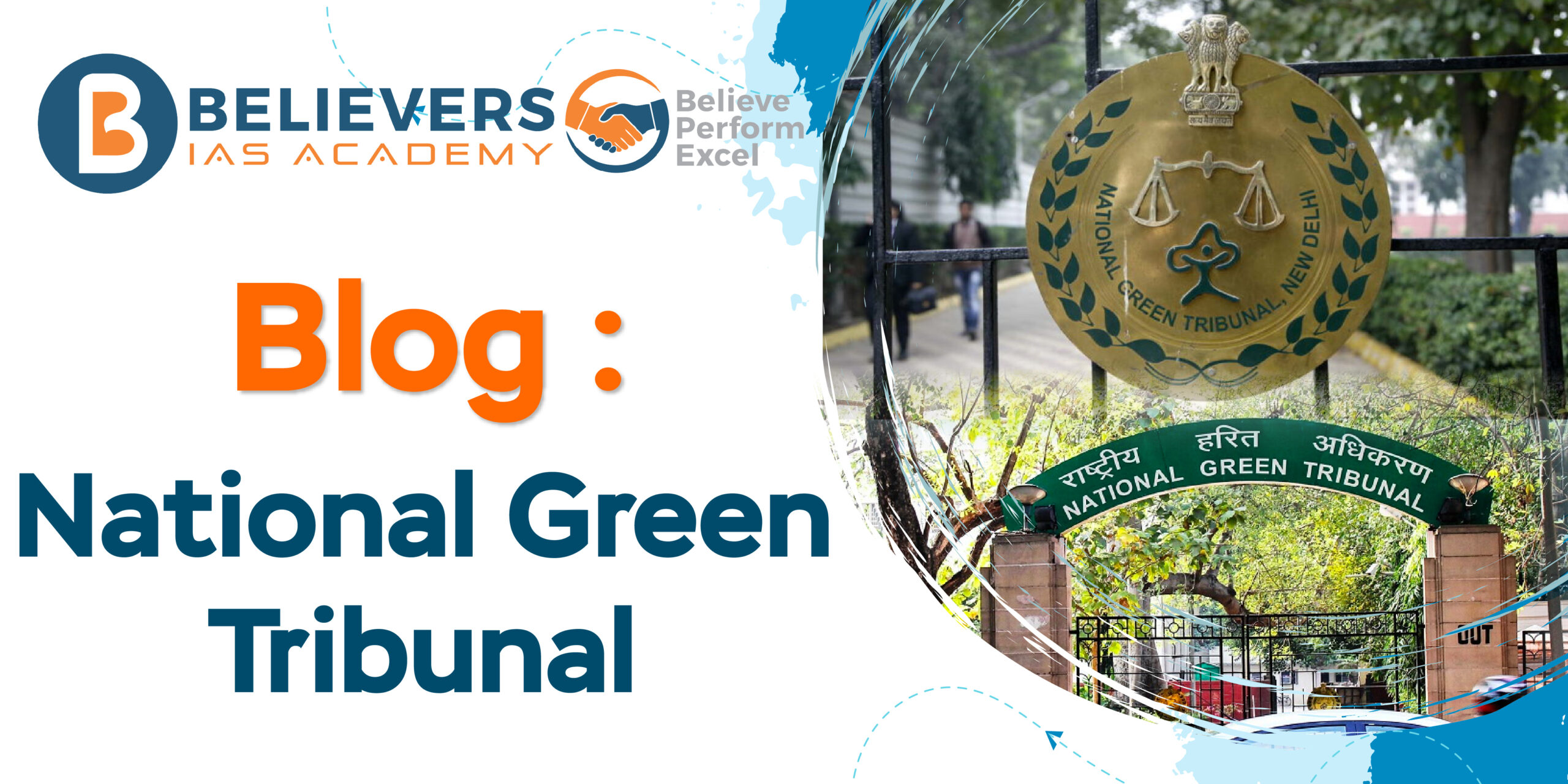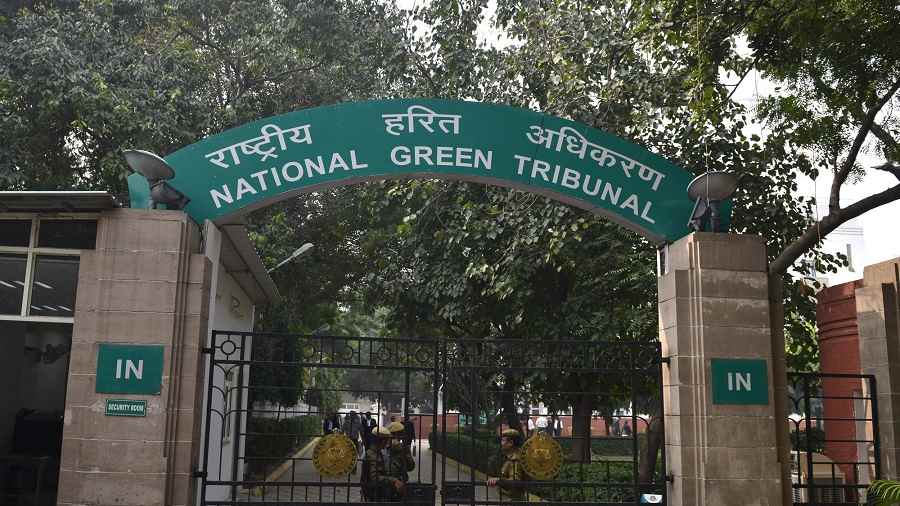National Green Tribunal (NGT)
Definition
National Green Tribunal (NGT) is a specialist court that was created to handle cases involving environmental protection and the preservation of natural resources. It was established to offer an efficient and effective legislative framework for tackling environmental problems and promoting sustainable development. The NGT is an autonomous agency that operates outside of the traditional legal system. Its principal goal is to provide a platform for the fast resolution of issues and disagreements involving environmental laws and regulations.
Roles and Functions:
- Legal proceedings: The NGT acts as a specialist court to hear cases and disagreements involving environmental issues. It has jurisdiction over a variety of topics, including waste management, forest conservation, biodiversity protection, air and water pollution, and more.
- Dispute Resolution: Resolving disputes involving environmental infractions and issues is one of the NGT’s main responsibilities. For redress and remedies for environmental harm, people, communities, organizations, and government agencies may turn to the NGT.
- Cases Are Solved Quickly: The NGT is renowned for emphasizing case resolution quickly. It attempts to deliver fast justice to stop additional environmental harm and guarantee that corrective actions are performed right away.
- Enforcement of Environmental Laws: The NGT is essential to India’s implementation of several environmental laws and regulations. It makes sure that those who violate the law are held accountable and that the proper fines or other remedies are applied when the law is broken.
- Implementation of Decisions: The NGT has the authority to direct the implementation of its decisions by government entities and other interested parties. This makes sure that the decisions are carried out in reality.
- Promotion of Sustainable Development: The NGT takes sustainability into account while making decisions. It promotes a harmonious approach to growth by attempting to strike a balance between environmental preservation and developmental requirements.
- Expertise: Knowledge and experience in environmental issues are present in the NGT’s judicial and expert members. This enables the tribunal to reach well-informed conclusions supported by data from science and advice from professionals.
- Preventive Measures: The NGT has the power to order preventive measures or orders to lessen possible environmental harm in addition to resolving ongoing disputes. By being proactive, we can stop environmental harm before it happens.
- Public Knowledge and Education: By making its judgements and conclusions available to the public, the NGT helps to increase public knowledge of and education about environmental issues. This promotes the understanding of environmental rules and regulations.
- Review and Appeals: The NGT’s decisions are subject to review and appeal, allowing parties to contest its findings if they consider there are grounds for reconsideration.
- Monitoring and Compliance: The NGT may keep an eye on how its decisions are being carried out to make sure they are being followed, and if additional action is required to guarantee that the environmental harm is remedied, it will do so.
Structure of NGT:
- Chairperson: A retired Supreme Court of India judge serves as the NGT’s chairperson. The Chairperson serves as the tribunal’s overall leader and is a key player in decision-making.
- Judicial Members: The tribunal is made up of judges who have served in the judiciary in the past or who are retired high court judges. These members provide their legal knowledge to the tribunal’s deliberations.
- Expert Members: Individuals with specialized expertise and experience in a range of environmental fields, including environmental science, ecology, forestry, wildlife conservation, and more, make up the NGT’s expert members. They provide the tribunal’s cases with technological and scientific expertise.
- Bench Makeup: The NGT conducts business using benches spread across the nation. Each bench has a minimum of one expert member and one judicial member. The makeup of the bench enables a thorough understanding of the legal and technical facets of environmental disputes.
Powers and Jurisdiction:
The National Green Tribunal (NGT) in India has been given particular authority and jurisdiction to deal with a variety of environmental issues and make sure that environmental laws and regulations are effectively implemented. The National Green Tribunal Act of 2010 defines the NGT’s authority and jurisdiction.
- Authority: The NGT has authority over issues about environmental protection, resource conservation, and the application of various environmental laws and regulations. Regarding environmental infractions, it addresses both civil and criminal concerns.
- Case-Hearing Authority: Cases involving significant problems about how to interpret environmental legislation and the Indian Constitution as they relate to environmental protection may be heard by the NGT and decided.
- Relief-Granting Powers: The NGT has the authority to provide a range of relief, including the return of property, compensation for environmental harm, and restitution of the environment. It strives to offer communities and people who have been harmed by the environment efficient solutions.
- Review and Appeal Authority: The NGT itself has the authority to review decisions made by the tribunal. In addition, parties who feel wronged by the NGT’s rulings can file an appeal with the Supreme Court of India within a set time frame.
- Orders and Directions: To prevent or address environmental harm, the NGT has the power to issue orders, directives, and injunctions. To deal with urgent issues, it may sometimes issue temporary orders.
- Environmental Laws: The NGT has the authority to carry out the terms of several important environmental laws, including the Environment (Protection) Act of 1986, the Air (Prevention and Control of Pollution) Act of 1981, and the Water (Prevention and Control of Pollution) Act of 1974. It has the authority to rule on issues about the application of these laws.
- Powers to impose fines and penalties: The NGT has the authority to impose fines, penalties, and compensation for environmental harm brought on by violations of environmental laws. To repair the harmed environment, it may also require the payment of environmental compensation.
- Authority to Review Government Decisions: If it is determined that a government decision violates environmental regulations, the NGT has the power to review it. This authority includes clearances issued for various projects.
- Powers to Address Specific Laws: The NGT specifically has powers to deal with matters related to laws such as the Water (Prevention and Control of Pollution) Act, 1974; the Water (Prevention and Control of Pollution) Cess Act, 1977; the Forest (Conservation) Act, 1980; the Air (Prevention and Control of Pollution) Act, 1981; the Environment (Protection) Act, 1986; the Public Liability Insurance Act, 1991; and the Biological Diversity Act, 2002.
Challenges faced by the NGT
- Understaffing and Vacancies: Both in its judicial and expert member posts, the NGT has frequently experienced problems with understaffing and vacancies. Delays in case hearings, a buildup of backlogs, and a general strain on the tribunal’s effectiveness might result from this.
- Workload and backlog: The NGT has occasionally had trouble successfully managing its workload due to the large number of cases and scarce resources. Due to the backlog of cases and the delay in delivering justice, litigants looking for quick resolutions may become frustrated.
- Lack of Knowledge: It’s possible that many individuals, particularly those in rural regions, are unaware of the NGT and its function in solving environmental issues. This ignorance may prevent people and communities from bringing environmental infractions to the tribunal’s attention and requesting a remedy.
- Limited Outreach: The NGT hasn’t done a great job of educating the public about its policies and procedures. Due to this, it has been unable to engage the public and stakeholders in meaningful ways, which is essential for fully resolving environmental challenges.
- Complex Procedures: People without legal backgrounds may find it difficult to follow the NGT’s legal processes and procedures. Simplifying these processes could increase access to justice, particularly for disadvantaged groups.
- Building Capacity: It is crucial to increase the NGT staff’s and members’ awareness of the intricate scientific, technical, and legal facets of environmental matters. Decisions could be made more intelligently with the use of training programs to increase their competence.





